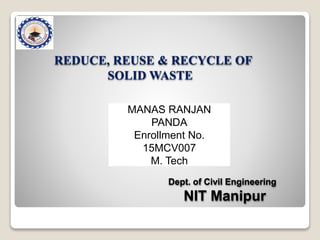
Reduce,Reuse,Recycle
- 1. REDUCE, REUSE & RECYCLE OF SOLID WASTE Dept. of Civil Engineering NIT Manipur MANAS RANJAN PANDA Enrollment No. 15MCV007 M. Tech
- 2. Introduction Present scenario Purpose of practicing 3Rs Modes of practicing 3Rs Advantages & Disadvantages Discussion
- 3. Introduction: Think about this three ways:- ◦ Reduce the amount of the Earth's resources that we use. ◦ Reuse Don't just bin it, could someone else make use of it? ◦ Recycle Can the materials be made into something new? REUSE ? RECYCLE ? REDUCE ? 3R
- 4. 500 billion plastic bags are used each year around the globe. Plastic bags are made up of toxic chemicals which can be toxic to human beings as well as aquatic life. 40 million plastic bottles discarded each day around the globe. Solution??? Present scenario :
- 5. Purpose of practicing 3R: Sl. No. Items Time period of decompose 1. Paper towel 2-4 weeks 2. Newspaper 6 weeks 3. Cardboard box 2 months 4. Plywood 1-3 years 5. Plastic bags 10-20 years 6. Tin can 50 years 7. Aluminium can 200 years 8. Glass bottle and jars undetermined
- 6. Purpose of practicing 3R: contd.. Air Water soil Pollutes Can be hazardous, if not managed properly. Creates unhygienic environment.
- 7. Landfills and Incineration versus Resource Recovery and Recycling Purpose of practicing 3R: contd.. Problems with conventional waste management (Landfills and incineration) • Waste disposal is expensive • Requires substantial inputs of labour, materials, energy, and land. • Establishing new landfills and incineration facilities is difficult because of high land costs and “NIMBY” attitudes. • Even the “modern” landfills with advanced systems could potentially face problems in a long term, as these technologies are not infallible. • Landfills are major source of methane (GHG). Benefits of integrated waste management (Resource recovery and recycling) •Countries and cities should pay equal attention to upstream options to reduce waste for final disposal and to reuse and recycle valuable resources. • Upstream options are almost always more costs effective than disposal. • Segregation and composting does not create substantial GHG if done properly.
- 8. Type of waste Recycled products Recycling potential Biomass Composts Future of compost depends on its environmental and agronomic quality and the dynamism of its market. Paper and cardboard Recovered paper (recycled paper Increasing demand in Asia. Plastics Recovered plastics Increasingly stringent regulations and growing demand for recovered plastics in Asia, favouring development and Inter nationalization of this market. Cost of collection system and volatile prices are limiting Factors. Ferrous Metals Steel In 2014, world production of scrap metal rose to 850Mt and consumption reached 805.5Mt. Can be recovered from MSW, construction waste, etc. E-wastes Recoverable materials Estimated that 10million computers contain 135,000 metric tons of recoverable materials, such as base metals, silicon, glass, plastic, and precious metals. Purpose of practicing 3R: contd..
- 9. Purpose of practicing 3R: contd.. In one way economy, a little effort is made to reduce the amount of materials consumed in production and hence the wastes are produced. Also little effort is made to reuse or recycle those wastes which mainly go for landfill. In closed-loop economy, nearly all outputs either become inputs to other manufacturing processes or are returned to natural systems as benign emissions rather than as pollutants, e.g., a closed- cycle processing plant takes in freshwater and does not discharge any liquid effluents. Rather, the water is constantly recycled and possibly utilized in the final product itself.
- 10. Recycle : Recycling is a series of steps that takes a used material and processes, remanufactures, and sells it as a new product. Things to be recycled… Fly ash Paper Plastic Aluminum cans Tins Glass HOW???
- 11. Manufacturing of bricks from fly ash:
- 12. 3Rs- Industry: Paper & Pulp
- 13. Recycling of glass bottles(waste):
- 14. Recycling of aluminum (waste):
- 15. Recycling of plastic (waste):
- 16. Advantages & Disadvantages: Advantages: Save our EARTH 1. Protects Environment 2. Reduces Energy Consumption 3. Reduces Pollution 4. Reduces Global Warming 5. Judicious and Sustainable use of Resources 6. Conserves Natural Resources 7. Reduces Amount of Waste to Landfills 8. Create Green Jobs
- 17. Disadvantages: 1. Not always Cost Effective 2. Recycled Products May not Last for Long 3. Unsafe and Unhygienic Recycling Sites 4. Not widespread on Large Scale 5. High Initial Cost
